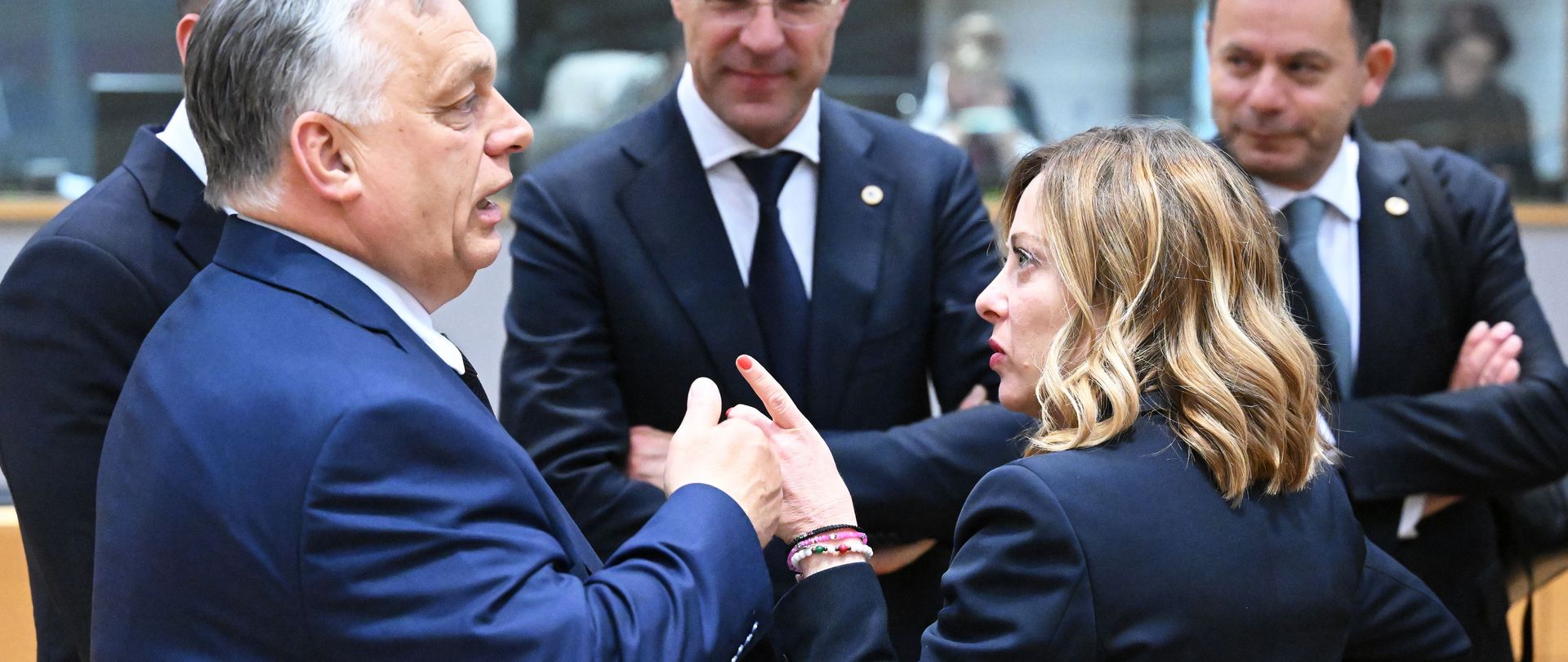
Hungarian Prime Minister Viktor Orban (L), Italian Prime Minister Giorgia Meloni (R) and Dutch Prime Minister Mark Rutte (C) attend the EU Summit of Heads of State and Government in Brussels, Belgium, on April 17, 2024.
© picture alliance / Anadolu | Dursun Aydemir
Shifts in the European political landscape
The European party system is in a state of transition. Already in 2019, the centre-right and centre-left parties that have long dominated EU integration, the European People's Party (EPP) and the European Socialists and Democrats (S&D), did not win a joint majority in the EU Parliament for the first time. Instead, at least three political groups were required to achieve a majority, usually the EPP, the S&D together with the liberal Renew and/or the European Greens. These four parties are also relatively stable in terms of their composition.
In European elections, the focus of attention on changes in the party system concentrates on two aspects. On the one hand, electoral choices: As at the national level, polls indicate that there will be a growth of far-right parties in the EU Parliament. In the EP, far-right parties are already split into two groups: the European Conservatives and Reformers (ECR), a national-conservative party, and Identity and Democracy (ID), a populist-to-extremist party. Together with non-attached far-right MEPs, these groups won almost 25 per cent of the seats. Polls suggest that their share could rise to as much as 30 per cent of seats. The precise extent of this increase remains to be seen, as does the impact it will have on EU policy. It is also unclear whether and to what extent parties on the left and right of the political spectrum will cooperate with the ECR and/or the ID group.
On the other hand, movement could come from changes in alliances within the European Parliament itself. In European elections, citizens continue to vote for national parties, whose MEPs join together to form political groups in the EP. According to current polls, the race for the third largest group is a close one between ECR, ID and Renew. However, the race could still be decided after the elections by Viktor Orbán's Hungarian Fidesz, which is without a political group after leaving the EPP in 2021 and may join either the ECR or ID group after the EU elections. A more far-reaching reorganisation of the far-right parties, including a merger of the ECR and ID groups, has also been discussed, but has so far failed due to disagreements, not least over how to deal with Russia. On the other side of the political spectrum, it remains to be seen whether the Italian Five Star Movement (currently non-attached) and the German "Bündnis Sahra Wagenknecht" will form a new parliamentary group alongside the European Left.
Publications
-
The Creeping Integration of Far-right Parties in Europe
Where Far-right Parties Are Integrated into the EU System and Where They Are Not
SWP Comment 2025/C 39, 19.09.2025, 8 Pagesdoi:10.18449/2025C39
-
Europe's democratic charade
Prepare for postelection negotiations changing the European Parliament just as much as voter choices.
in: Politico, Opinion, 03.06.2024 -
The Center Holds, But at What Cost?
European politics is braced for a potential right-wing surge at the 2024 European Parliament elections. The center-right European People’s Party (EPP) may face tricky decisions.
in: Internationale Politik Quarterly, No. 2, Spring 2024 -
Geostrategy from the Far Right
How Eurosceptic and Far-right Parties Are Positioning Themselves in Foreign and Security Policy
SWP Comment 2024/C 08, 01.03.2024, 8 Pagesdoi:10.18449/2024C08
-
What to expect from the right-wing populist shift in Italy?
The right-wing populist alliance around post-fascist Giorgia Meloni has won the parliamentary elections in Italy. The new government faces enormous economic challenges and will be a difficult and complicated cooperation partner for the EU and Germany, writes Paweł Tokarski.
Point of View, 04.10.2022